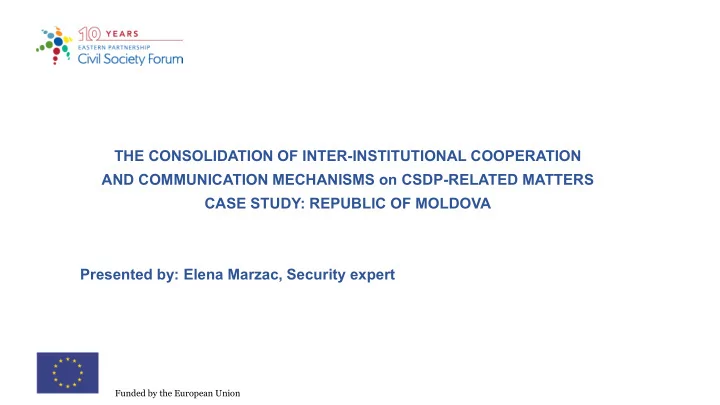

THE CONSOLIDATION OF INTER-INSTITUTIONAL COOPERATION AND COMMUNICATION MECHANISMS on CSDP-RELATED MATTERS CASE STUDY: REPUBLIC OF MOLDOVA Presented by: Elena Marzac, Security expert Funded by the European Union
Main findings: The structures for inter-agency cooperation on CSDP are set up and running, but their working mechanisms and procedures need further development and clarifications Lack of a dedicated pool of CSDP experts Low inter-agency selection, deployment and return procedures: MoD vs other ministries Insufficient training and substantial knowledge of CSDP-related matters Lack of a consistent narrative about benefits, opportunities, and challenges Political, economic, financial, and security interests and implications of Partners’ participation in CSDP have not been properly explained to the public opinion Funded by the European Union
Plan and conduct, at the appropriate timing, periodic public information campaigns on CSDP matters Political decisions on participation in a CSDP operation or mission should be accompanied by an extensive public information campaign Such public information campaigns might include: technical briefings and press conferences press releases and statements production and circulation of media material EU’s CSDP press team information and communication products could be used to document and prepare these media campaigns Funded by the European Union
Enhance the education and training on CSDP of journalists, researchers, academics, and other experts of the civil society Events organised by the European Security and Defence College about the EU's Common Security and Defence Policy. CSDP documentation visits for journalists and civil society to Brussels, and to the Headquarters of EU operations and missions where Partner participants are involved Leading European think tanks should be encouraged to offer short term visiting fellowship stages on CSDP to Partner researchers EUMS should consider inviting governmental and non-governmental experts to their Strategic Communication Orientation Courses Funded by the European Union
Engage in cooperation with the East STRATCOM Task Force on addressing the on-going Russian disinformation campaigns in the RM Share best practices in strategic communications and ensure access to objective information in RM, as well as ensuring support for Moldovan independent media Increase the resilience of the RM public to hybrid threats, a public campaign should explain how disinformation and propaganda operate (expose propaganda techniques) Enhance its academic research on information security Funded by the European Union
Set up an effective organization for public and strategic communications (STRATCOM) on European Integration The main tasks of the STRATCOM on EI should include: enabling effective communication and awareness raising providing information to the Moldovan population to the international community improving MoD’s capacity to identify, assess, and respond to disinformation activities by internal and external actors. contributing to the general understanding, and the engagement of the wider public in the promotion of perceptions, attitudes, behaviors and thoughts favorable to MD’s European integration. The STRATCOM on EI should feature an inter-agency working group whose meetings should be chaired by a High-level official (State Secretary level). It should include STRATCOM branches in all relevant ministries and other Executive agencies, who are involved in the process of European integration (MFAEI, MoD, MIA, SSS, MFin, MJ, Ministry of Economy, etc.) Funded by the European Union
Draft and approve a “Public Communication and Information Strategy of MD on European Integration for the period of 2020- 2022” Strategy Implementation Action plan Exchanges of information and experience Funded by the European Union
Recommend
More recommend